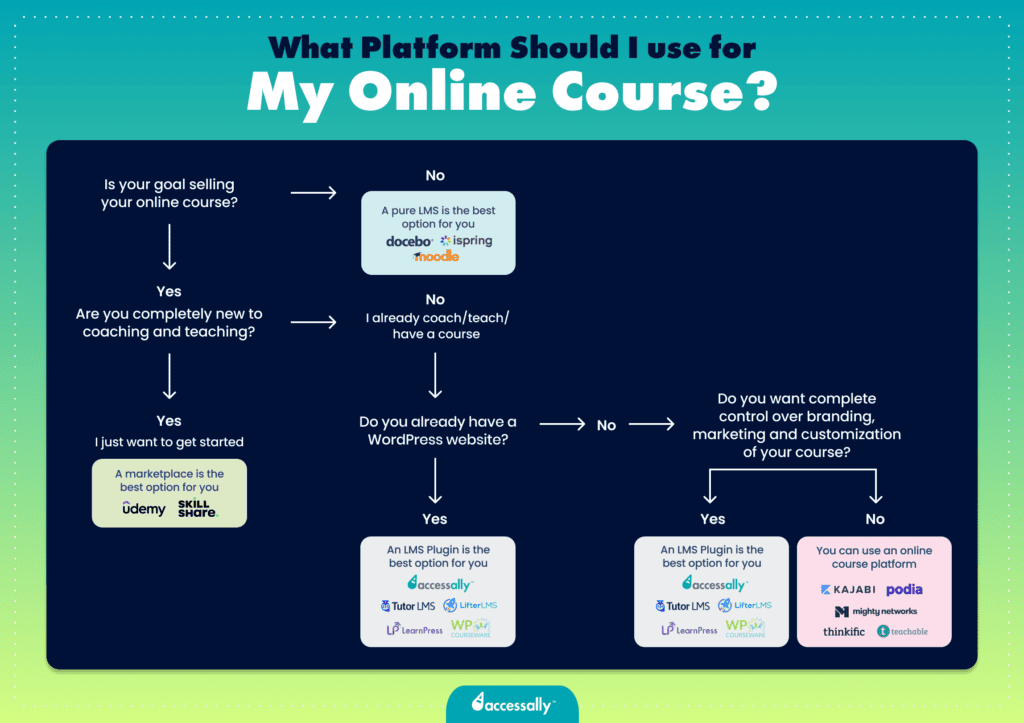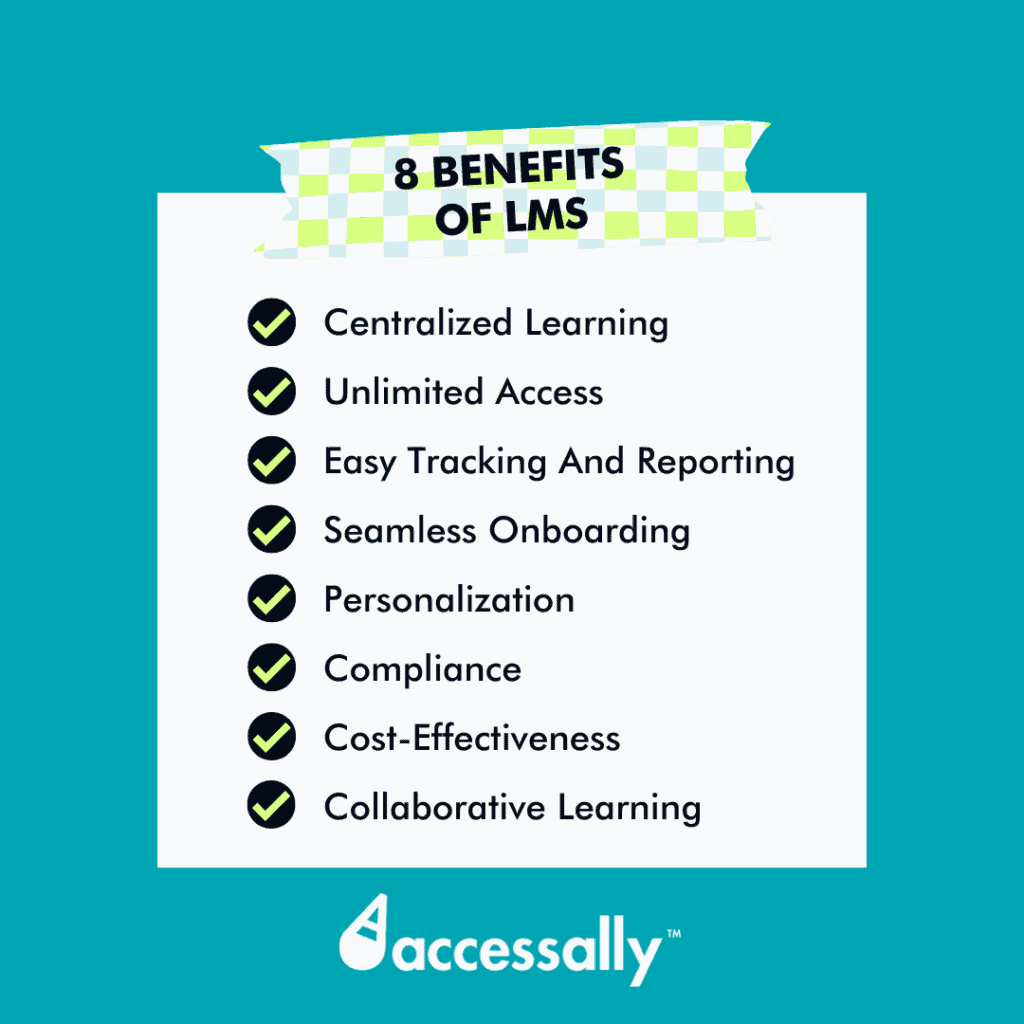If you’re exploring options for hosting training materials or onboarding team members for your organization, you’re probably researching e-learning options and LMS or learning management systems — which can get confusing, fast.
LMS are the software that host online courses or training and are used by both educational institutions and companies. They help people learn in an organized and dynamic way and offer many advantages for the organizations as well.
This article will explain what you need to know about LMS as well as the benefits they provide for organizations.
What Exactly Is an LMS?
The term “LMS” is often used as an umbrella term for different types of course delivery systems: standalone LMS platforms (Podia, Kajabi), plugins (AccessAlly, Lifter LMS), or “pure” LMS (Docebo, Moodle).
For independent creators looking to sell a course, LMS plugins and online course platforms are more suitable solutions.
If you’re now wondering which type of course delivery system you need, check out this article and the following flow chart we’ve created to help you make the right decision
This article will be focusing on “pure” LMS and the benefits organizations will garner by using one. These LMS are used by large organizations that aren’t looking to sell courses, but who need a way of hosting training or course material for internal team members or partners. LMS are designed mainly with two purposes in mind: corporate training and education.
If you’d like to go into more depth about “pure” LMS, you can consult this article on the different types that exist.


LMS for Corporate Training
LMS are often used by companies large and small to train employees, partners, or clients. A corporate LMS can serve lots of different purposes: facilitating client onboarding, providing skill development training for staff, compliance training modules, etc.
Some popular examples of Corporate LMS include: Docebo, Litmos, and iSpring Suite. If you want to compare specific LMS check out this article that goes into our recommendations.
LMS In Academic Institutions
LMS are also used by educational institutions (both K-12 and higher education) to integrate e-learning into their curricula. They are a great way to keep students engaged — even in the event of fully remote learning.
An academic LMS provides students with a centralized digital hub for accessing study materials, courses, and assessments. Some widely used Academic LMS include: Moodle, Canvas, and Blackboard Learn.
Top 8 Benefits of LMS for Organizations
OK! Now that we’ve got the basics out of the way, let’s explore the 8 big benefits of LMS for organizations:


1. Centralized Learning Management
LMS centralizes the learning experience by putting all course material into one central location. Not only does this reduce the risk of losing important data, but it simplifies learning for trainees and students — no need to search through multiple platforms to find the relevant material. Students and trainees can have access to all kinds of materials: presentations, videos, reading material, quizzes, discussion boards, etc.
On the administrative side, LMS makes it easy for course administrators or company managers to monitor progress, track completion rates, and support the learning process as needed. If learning material needs to be updated, the centralized nature makes it easy to locate material and implement the desired changes.
2. Unlimited Access For Learners
A huge benefit of an LMS is the fact that it empowers students and employees to learn from anywhere. With remote work becoming more and more common, LMS enable employers to provide robust training and support to their employees regardless of location or time zone.
LMS for educational organizations allow schools to offer students more flexibility in completing their studies, as students can fit learning into their busy schedules. Plus, students of all ages are on their phones all the time; putting learning literally in their hands, where they are already spending their time helps ensure better engagement and completion rates.
With learning material always available, LMS allow learners to work through material at their own pace, with students able to reread difficult material or, alternately, skip through concepts that they have already mastered.
3. Easy Tracking And Reporting
Most LMS have built-in monitoring and progress tracking tools so that learners and administrators can be aware of course progress, completion rates, assessment scores, and learner feedback.
Organizations can use this information to identify problems with course material so that course content can be adjusted or revised to better suit learners. And learners can get feedback and results of quizzes and assessments that can lead to a better understanding of their own knowledge and a culture of self-improvement.
4. Seamless Onboarding
For corporations specifically, creating an enhanced onboarding experience for team members is a major advantage of using an LMS. An LMS can revolutionize a company’s onboarding process by providing a centralized platform for training and orientation.
An LMS ensures that new hires have access to all the necessary company information and allow the onboarding process to be organized and standardized across departments and locations.
5. More Effective Training Through Personalization
An LMS allows organizations to cater to learners’ individual needs and interests by creating personalized learning paths.
For a company, onboarding through an LMS ensures easy distribution of standardized company information like policies and procedures; but through tailored content delivery, further training materials can be adapted to employees’ respective roles.
LMS often offer adaptive learning paths, which present an extremely personalized approach. This feature is able to adapt a learning path based on each individual’s progress and proficiency and leads to enhanced learning and better outcomes for employees and students alike.
6. Enhanced Compliance With Regulations
Many businesses need to make sure their employees fulfill required certifications or training. Schools must also make sure their faculty and staff have proper up-to-date certifications.
An LMS makes it easier to deliver trainings and ensure that every employee is compliant. LMS platforms can even automate compliance reminders and notifications to make sure employees stay up to date with required training. Managers and leaders can easily visualize which employees have completed certain certifications.
7. Cost-Effectiveness
Implementing an LMS requires an upfront investment, but it’s one that will save significant costs over time.
LMS allows organizations to leverage a vast repository of course material that can be reused indefinitely, which means once the material is created, it can be used over and over again for infinite groups of students or across corporations’ teams and departments.
An LMS also enables organizations to save money by automating course delivery. There’s no need to hire a facilitator or provide classroom space when the course is entirely online.
Companies can also experience an additional cost benefit when they use an LMS not only for onboarding but also for learning and development programs. Organizations that provide continuous training opportunities tend to foster greater employee loyalty, ultimately resulting in reduced turnover costs.
8. Collaborative Learning Opportunities
Collaboration between learners is a benefit of LMS that mostly concerns academic institutions. Many LMS are designed with features that promote engagement and participation and create a sense of community, including discussion boards, forums, and group collaboration tools that promote interaction among students.
By leveraging collaborative features, schools can create an engaging learning environment. Collaborative learning leads to better retention of material and promotes critical thinking and problem-solving skills, leading to student and organizational success.




